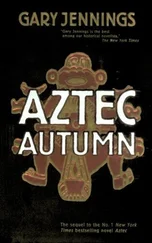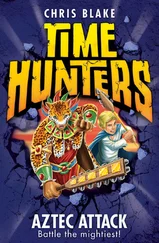Gary Jennings - Aztec
Здесь есть возможность читать онлайн «Gary Jennings - Aztec» весь текст электронной книги совершенно бесплатно (целиком полную версию без сокращений). В некоторых случаях можно слушать аудио, скачать через торрент в формате fb2 и присутствует краткое содержание. Жанр: Старинная литература, на английском языке. Описание произведения, (предисловие) а так же отзывы посетителей доступны на портале библиотеки ЛибКат.
- Название:Aztec
- Автор:
- Жанр:
- Год:неизвестен
- ISBN:нет данных
- Рейтинг книги:4 / 5. Голосов: 1
-
Избранное:Добавить в избранное
- Отзывы:
-
Ваша оценка:
- 80
- 1
- 2
- 3
- 4
- 5
Aztec: краткое содержание, описание и аннотация
Предлагаем к чтению аннотацию, описание, краткое содержание или предисловие (зависит от того, что написал сам автор книги «Aztec»). Если вы не нашли необходимую информацию о книге — напишите в комментариях, мы постараемся отыскать её.
"Anyone who reads, anyone who still lusts for adventure or that book you can't put down, will glory in Aztec."--Los Angeles Times
Aztec
Aztec
Aztec — читать онлайн бесплатно полную книгу (весь текст) целиком
Ниже представлен текст книги, разбитый по страницам. Система сохранения места последней прочитанной страницы, позволяет с удобством читать онлайн бесплатно книгу «Aztec», без необходимости каждый раз заново искать на чём Вы остановились. Поставьте закладку, и сможете в любой момент перейти на страницу, на которой закончили чтение.
Интервал:
Закладка:
I remember two Xaltócan men who were raised from the macehualtin to the pípiltin and given an estimable lifetime income. Colotic-Miztli, an elderly onetime warrior, had lived up to his name of Fierce Mountain Lion by doing some great feat of arms in some forgotten war against some long-ago enemy. It had cost him such scars that he was gruesome to look at, but it had gained him the coveted -tzin suffix to his name: Miztzin, Lord Mountain Lion. The other man was Quali-Ameyatl, or Good Fountain, a mild-mannered young architect who did no deed more notable than to design some gardens at the governor's palace. But Ameyatl was as handsome as Miztzin was hideous, and during his work at the palace, he won the heart of a girl named Dewdrop, who happened to be the governor's daughter. When he married her, he became Ameyatzin, the Lord Fountain.
I have tried to make clear that our Lord Red Heron was genial and generous, but above all he was a just man. When his own daughter Dewdrop tired of her lowborn Lord Fountain and was surprised in an adulterous act with a blood-born píli, Red Heron commanded that both she and the man be put to death. Many of his other nobles petitioned that the young woman be spared her life and instead be banished from the island. Even the husband swore that he forgave his wife's adultery, and that he and Dewdrop would remove to some far country. But the governor would not be swayed, though we all knew he loved that daughter very much.
He said, "I would be called unjust if, for my own child, I should waive a law that is enforced against my subject people." And he said to Lord Fountain, "The people would someday maintain that you forgave my daughter out of deference to my office and not of your own free will." And he commanded that every other woman and girl of Xaltócan come to his palace and witness Dewdrop's execution. "Especially all the nubile but unmarried maidens," he said, "for their juices run high, and they might be inclined to sympathize with my daughter's dalliance, or even envy it. Let them be shocked at her dying, that they may dwell instead on the severity of the consequences."
So my mother went to the execution, and took Tzitzitlmi.
On their return, my mother said the errant Dewdrop and her lover had been strangled, with cords disguised as garlands of flowers, and in full view of the populace, and that the young woman took her punishment badly, with terrors and pleas and struggling, and that her betrayed husband Good Fountain wept for her, but that the Lord Red Heron had watched without expression. Tzitzi said nothing of the spectacle. However, she told me of meeting at the palace the condemned woman's young brother, Red Heron's son Pactli.
"He looked long at me," she said with a shudder, "and he smiled and bared his teeth. Can you believe such a thing, on such a day? It was a look that gave me gooseflesh."
I would wager that Red Heron did no smiling that day. But you can understand why all the island folk so esteemed our impartially fair-minded governor. In truth, we all hoped the Lord Red Heron would live to a great age, for we regarded unhappily the prospect of being governed by that son Pactli. The name means Joy, a misgiven name if ever there was one. He was an ill-natured and despotic brat long before he even wore the loincloth of manhood. That obnoxious offspring of a courtly father did not, of course, freely associate with any middle-class boys like myself and Tlatli and Chimali, and anyway was a year or two older. But, as my sister Tzitzi flowered into beauty, and Pactli began to manifest increased interest in her, she and I came to share a special loathing of him. However, all that was still in the future.
Meanwhile, ours was a prosperous and comfortable and untroubled community. We who had the good fortune to live there did not have to grind away our energies and spirits just for subsistence. We could look to horizons beyond our island, to heights above those to which we had been born. We could dream, as did my friends Chimali and Tlatli. Both their fathers were sculptors at the quarries, and those two boys, unlike myself, aspired to follow their fathers' trade of art, but more ambitiously than their fathers had done.
"I want to be a better sculptor," said Tlatli, scraping away at a fragment of soft stone which was actually beginning to resemble a falcon, the bird for which he was named.
He went on, "The statues and friezes carved here on Xaltócan go away in the big freighting canoes unsigned and their artists unacknowledged. Our fathers get no more credit for their work than a slave woman who weaves mats of the lake reeds. And why? Because the statues and ornaments we make here are as indistinguishable as those reed mats. Every Tlaloc, for example, looks exactly like every Tlaloc that has been sculptured on Xaltócan since our fathers' fathers' fathers were carving them."
I said, "Then they must be what the priests of Tlaloc want."
"Ninotlancuicui in tlamacazque," growled Tlatli. "I pick my teeth at the priests." He could be as stolid and immovable as any stone figure. "I intend to do sculptures different from all that have ever been done before. And no two, even of my own, will be alike. But all will be so recognizably my work that people will exclaim, 'Ayyo, a statue by Tlatli!' I will not even have to sign them with my falcon symbol."
"You want to do a work as fine as the Sun Stone," I suggested.
"Finer than the Sun Stone," he said stubbornly. "I pick my teeth at the Sun Stone." And I thought that audacity indeed, for I had seen the Sun Stone.
But our mutual friend Chimali gazed toward even farther vistas than did Tlatli. He intended so to refine the art of painting that it would be independent of any sculpture underneath. He would be a painter of pictures on panels and murals on walls.
"Oh, I will color Tlatli's lumpy statues for him, if he likes," said Chimali. "But sculpture requires only flat colors, since its shape and modeling gives the colors light and shade. Also, I am weary of the same old unvarying colors other painters and muralists use. I am trying to mix new kinds of my own: colors that I can modulate in tint and hue so that the colors themselves give an illusion of depth." He made excited gestures, modeling the empty air. "When you see my pictures you will think they have shape and substance, even when they have none, when they have no more dimension than the panel itself."
"But to what purpose?" I asked.
"Of what purpose is the shimmering beauty and form of a hummingbird?" he demanded. "Look. Suppose yourself to be a priest of Tlaloc. Instead of dragging a huge statue of the rain god into a small temple room, and thereby cramping the room even more, the priests of Tlaloc can simply have me paint on a wall a portrait of the god—as I imagine him to be—and with a limitless rain-swept landscape stretching away behind him. The room will seem immeasurably larger than it really is. And there is the advantage of thin, flat pictures over gross and bulky sculptures."
"Well," I said to Chimali, "a shield usually is fairly thin and flat." I was making a joke: Chimali means shield, and Chimali himself was a lean and lanky boy.
At my friends' ambitious plans and grandiose boasts I smiled indulgently. Or perhaps a little enviously, for they knew what they wanted eventually to be and do, and I did not. My mind had yet conceived no notion of its own, and no god had yet seen fit to send me a sign. I knew only two things for sure. One was that I did not want to hew and haul stone from a noisy, dusty, god-menaced quarry. The other was that, whatever career I essayed, I did not intend to pursue it on Xaltócan or in any other provincial backwater.
If the gods allowed, I would take my chances in the most challenging but potentially most rewarding place in The One World—in the Uey-Tlatoani's own capital city, where the competition among ambitious men was most merciless, and where only the worthiest could rise to distinction—in the splendid, the wondrous, the awesome city of Tenochtítlan.
Читать дальшеИнтервал:
Закладка:
Похожие книги на «Aztec»
Представляем Вашему вниманию похожие книги на «Aztec» списком для выбора. Мы отобрали схожую по названию и смыслу литературу в надежде предоставить читателям больше вариантов отыскать новые, интересные, ещё непрочитанные произведения.
Обсуждение, отзывы о книге «Aztec» и просто собственные мнения читателей. Оставьте ваши комментарии, напишите, что Вы думаете о произведении, его смысле или главных героях. Укажите что конкретно понравилось, а что нет, и почему Вы так считаете.











